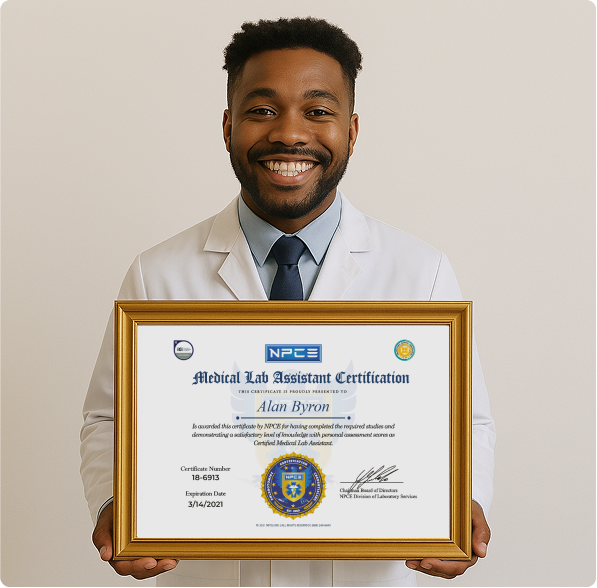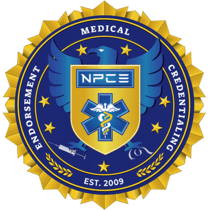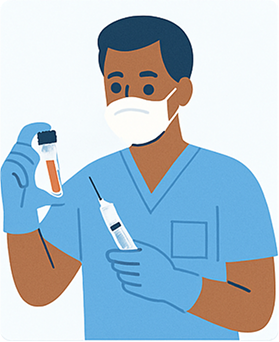Phlebotomy Technician Career
A career as a Phlebotomy Technician offers a fast entry point into the medical field with strong job stability and growth potential. Phlebotomy technicians are responsible for drawing blood from patients for tests, transfusions, or donations—playing a key role in patient diagnosis and care. This healthcare career requires strong attention to detail, good communication skills, and proper training through a certified phlebotomy program. With increasing demand in hospitals, clinics, laboratories, and blood banks, phlebotomy technicians enjoy flexible work environments and opportunities for advancement. Whether you're just starting out or switching careers, becoming a phlebotomy technician is a smart choice for anyone passionate about healthcare and patient service.
Start your healthcare career today!


IS PHLEBOTOMY CERTIFICATION WORTH IT?

IS PHLEBOTOMY CERTIFICATION WORTH IT?

KEY REASONS WHY PHLEBOTOMY CERTIFICATION IS WORTH IT:
Fast Training
Complete a program in under 12 weeks.
Low Cost
Certification programs are affordable compared to other medical careers.
Job Security
The demand for phlebotomists is projected to grow by 10% or more over the next decade.
Flexible Work Environment
Work in hospitals, labs, clinics, or as a mobile phlebotomist.
Great Career Foundation
Use your experience to grow into other healthcare roles.
What Skills Will You Learn in a Phlebotomy Certification Program?
Phlebotomy certification programs are designed to teach you both technical skills and soft skills essential for success in healthcare. Here’s what you’ll learn:
- 1
Venipuncture techniques (drawing blood from veins)
- 2
Capillary puncture (fingerstick and heelstick)
- 3
Handling, labeling, and transporting blood specimens
- 4
Infection control & safety protocols
- 5
Anatomy & physiology basics
- 6
Medical terminology
- 7
Proper patient identification and documentation
- 8
Effective communication with patients
- 9
Managing patient anxiety during blood draws
- 10
Attention to detail and accuracy
- 11
Ethical and professional behavior
How to Choose the Best Phlebotomy Certification Program
Phlebotomy certification program key factors
- 1

ACCREDITATION. Make sure the school or institution is accredited and recognized by a professional body.
- 2

HANDS-ON TRAINING. Choose programs that offer real clinical practice.
- 3

EXAM PREPARATION. Some programs include preparation for national certification exams.
- 4

FLEXIBLE SCHEDULING. Many schools offer evening or weekend classes for working adults.
- 5

JOB PLACEMENT ASSISTANCE. Check if the program helps with internships or job placement after certification.
Start Your Phlebotomy Certification Journey with NPCE Today

Step forward in your healthcare career with NPCE’s phlebotomy certification. As a certified phlebotomy technician, you’ll play a critical role in patient care and healthcare diagnostics. Contact NPCE now to learn more about the phlebotomy certification process and how to join our esteemed community of healthcare professionals.
COMMON CHALLENGES IN PHLEBOTOMY & HOW CERTIFICATION HELPS
Working as a phlebotomist isn’t without its challenges. You may encounter:
 Difficult or anxious patients
Difficult or anxious patients  Hard-to-find veins
Hard-to-find veins Strict safety protocols
Strict safety protocols Physically demanding shifts
Physically demanding shiftsA Phlebotomy Certification ensures you’re well-trained to handle these situations safely and professionally. It prepares you to stay calm under pressure and deliver excellent patient care.
QUICK FACTS ABOUT PHLEBOTOMY CERTIFICATION (2025)
- 1
Program Length 4–12 weeks
- 2
Average Annual Salary (U.S.) $36,000 – $52,000
- 3
Job Growth (2024–2034) Projected 10% increase (faster than avg)
- 4
Work Environment Hospitals, Clinics, Labs, Blood Banks
WHY IS PHLEBOTOMY CERTIFICATION IMPORTANT?
- 1
Knowledge of blood collection procedures
- 2
Adherence to patient care and safety standards
- 3
Familiarity with medical terminology and laboratory protocols
- 4
Hands-on clinical experience
Start Your Phlebotomy Certification Journey with NPCE Today

Step forward in your healthcare career with NPCE’s phlebotomy certification. As a certified phlebotomy technician, you’ll play a critical role in patient care and healthcare diagnostics. Contact NPCE now to learn more about the phlebotomy certification process and how to join our esteemed community of healthcare professionals.